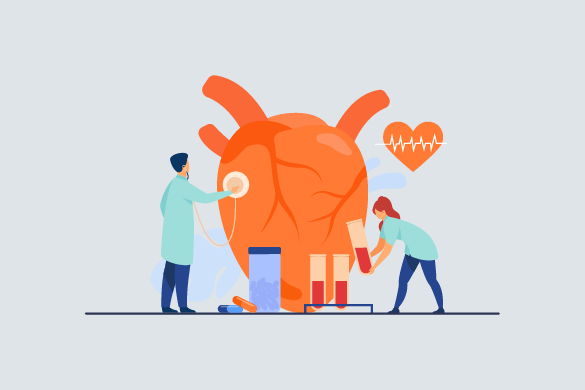
DM - Cardiology
- 108 Colleges
Cardiology is the branch of medicine that deals with the study and treatment of cardiovascular ailments. .
Cardiology is the branch of medicine that deals with the study and treatment of cardiovascular ailments. It is a specialization in internal medicine,that centers around the diagnosis and treatment of various diseases of the heart and circulatory systems such as congenital heart diseases, coronary artery disease, valvular heart disease, electrophysiology, and so on. Procedures such as inserting pacemakers, angioplasty, catheterizations are carried out by cardiologists. Further specializations in the field include adult and pediatric. Cardiothoracic surgery, however, is a specialization of general surgery. Sports cardiology, preventive cardiology, and cardiac rehabilitation are emerging specialties with much scope in this field. Research opportunities are abundant for students of the heart as modern lifestyles and food habits are increasing the risks of such disease. Promising papers are being published in relation to cardiomyopathy, hypertension, genetic causes in heart failures, cardiovascular imaging, and so on. Emerging technologies and research are changing the way of treatment and rehabilitation. These include mitral valve modulation and repair which might become an alternative to surgery, cardiac decellularization and engineered heart tissue, novel embolic protection to prevent strokes and cardiovascular magnetic research abnormalities post COVID-19 recovery. The future of cardiovascular treatment and research is expected to be transformed by artificial intelligence, mobile devices that constantly monitor and identify early signs and symptoms, and as such is promising.
Doctor of Medicine in Cardiology is a career-oriented course that is often three or more years in duration, based on the respective institutes and specialty. Students will be trained mainly in the subjects of clinical cardiology and fundamentals of cardiovascular diseases, molecular biology and genetics, patient evaluation and effective communication, sudden heart failures and emergency response, preventive cardiology, atherosclerotic cardiovascular disease, disease of the heart, pericardium, and pulmonary vasculature bed, population-based heart ailments, and cardiovascular disease and disorders of other organs. At the end of the course, students are expected to master etiopathology, hemodynamic, clinical evaluation, non-invasive and invasive evaluation, and management strategies for all major and minor cardiovascular disorders. They should be able to perform and interpret various non-invasive techniques including electrocardiography, stress testing, radiography, echocardiography, and Holter monitoring. Knowledge of invasive techniques such as insertion of a pacemaker, cardiac catheterization, and electrophysiology. A thorough understanding of the functional principles of various bio-medical equipment used for such evaluation and treatment, and the ability to assist in interventions including coronary and congenital interventions are expected. At the end of the course, the student should be able to recognize key medical problems, identify the determinants of such problems, take a detailed history, perform a full examination, interpret relevant investigations (imaging and laboratory), diagnose, plan and deliver comprehensive treatment plans and further rehabilitation procedures and manage cardiological emergencies, efficiently and within the principles of professional ethics and laws of the nation. Students, during the duration of the course, are expected to submit at least two projects; one of which must be submitted for publication in a reputed journal before submission.
Candidates with MBBS qualification from a medical college or university recognized by the MCI and having a valid NEET PG score are eligible to apply for the course. Medical Doctors with qualifications in general medicine and pediatrics are also eligible. Bright opportunities await the doctors’ post-course completion as cardiologists are always in demand. They can pursue careers as specialist consultants in hospitals, lecturers in medical colleges, defense health services, sports medicine or become scientists in the field after prolific research.
